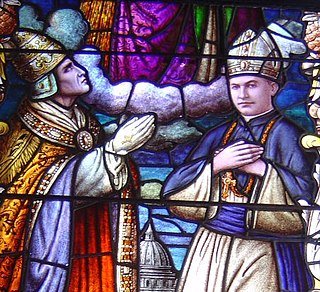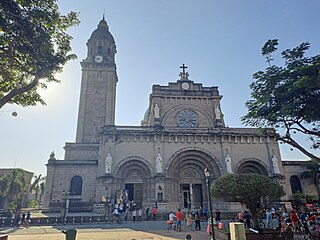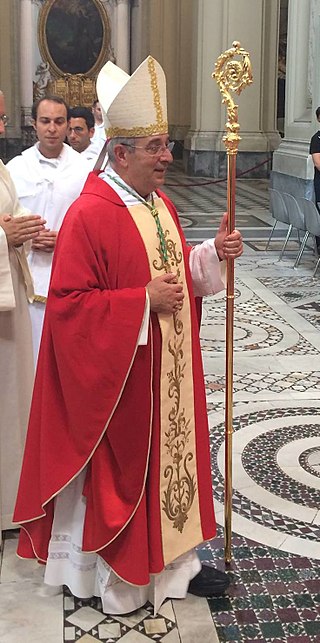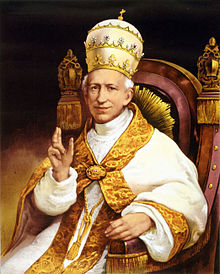The Roman Curia comprises the administrative institutions of the Holy See and the central body through which the affairs of the Roman Catholic Church are conducted. The Roman Curia is the institution which the Roman Pontiff ordinarily makes use of in the exercise of his supreme pastoral office and universal mission in the world. It is at the service of the Pope, successor of Peter, and of the Bishops, successors of the Apostles, according to the modalities that are proper to the nature of each one, fulfilling their function with an evangelical spirit, working for the good and at the service of communion, unity and edification of the Universal Church and attending to the demands of the world in which the Church is called to fulfill its mission.
A vicar is a representative, deputy or substitute; anyone acting "in the person of" or agent for a superior. Linguistically, vicar is cognate with the English prefix "vice", similarly meaning "deputy". It also refers to a senior priest in the Church of England. The title appears in a number of Christian ecclesiastical contexts, but also as an administrative title, or title modifier, in the Roman Empire. In addition, in the Holy Roman Empire, a local representative of the emperor, such as an archduke, could be styled "vicar".

A prelate is a high-ranking member of the Christian clergy who is an ordinary or who ranks in precedence with ordinaries. The word derives from the Latin praelatus, the past participle of praeferre, which means 'carry before', 'be set above or over' or 'prefer'; hence, a prelate is one set over others.
An ecclesiastical court, also called court Christian or court spiritual, is any of certain courts having jurisdiction mainly in spiritual or religious matters. In the Middle Ages, these courts had much wider powers in many areas of Europe than before the development of nation states. They were experts in interpreting canon law, a basis of which was the Corpus Juris Civilis of Justinian, which is considered the source of the civil law legal tradition.
A pastoral council is a consultative body in dioceses and parishes of the Catholic Church that serves to advise the parish priest or bishop about pastoral issues. The council's main purpose is to investigate, reflect and reach conclusions about pastoral matters to recommend to the parish priest or bishop as appropriate.

A consistory court is a type of ecclesiastical court, especially within the Church of England where they were originally established pursuant to a charter of King William the Conqueror, and still exist today, although since about the middle of the 19th century consistory courts have lost much of their subject-matter jurisdiction. Each diocese in the Church of England has a consistory court.
Personal prelature is a canonical structure of the Catholic Church which comprises a prelate, clergy and laity who undertake specific pastoral activities. The first personal prelature is Opus Dei. Personal prelatures, similar to dioceses and military ordinariates, were originally under the governance of the Vatican's Congregation for Bishops. Since 4 August 2022, personal prelatures have instead been governed under the Dicastery for the Clergy. Personal prelatures are composed of lay people served by their own secular clergy and prelate. Unlike dioceses, which cover territories, personal prelatures—like military ordinariates—take charge of persons as regards some objectives irregardless of where they live.

An ordinary is an officer of a church or civic authority who by reason of office has ordinary power to execute laws.

The Archdiocese of Manila is the archdiocese of the Latin Church of the Catholic Church in Metro Manila, Philippines, encompassing the cities of Manila, Makati, San Juan, Mandaluyong, Pasay, and Taguig. Its cathedral is the Minor Basilica and Metropolitan Cathedral of the Immaculate Conception, also known as the Manila Cathedral, located in Intramuros, which comprises the old city of Manila. The Blessed Virgin Mary, under the title Immaculate Conception, is the principal patroness of the archdiocese.
The hierarchy of the Catholic Church consists of its bishops, priests, and deacons. In the ecclesiological sense of the term, "hierarchy" strictly means the "holy ordering" of the church, the Body of Christ, so to respect the diversity of gifts and ministries necessary for genuine unity.
Ecclesiastical jurisdiction is jurisdiction by church leaders over other church leaders and over the laity.
In Christianity, the term secular clergy refers to deacons and priests who are not monastics or otherwise members of religious life. Secular priests are priests who commit themselves to a certain geographical area and are ordained into the service of the residents of a diocese or equivalent church administrative region. That includes serving the everyday needs of the people in parishes, but their activities are not limited to that of their parish.

Cardinal Vicar is a title commonly given to the vicar general of the Diocese of Rome for the portion of the diocese within Italy. The official title, as given in the Annuario Pontificio, is Vicar General of His Holiness.
In the Catholic Church, a canonical visitation is the act of an ecclesiastical superior who in the discharge of his office visits persons or places with a view to maintaining faith and discipline and of correcting abuses. A person delegated to carry out such a visitation is called a visitor. When, in exceptional circumstances, the Holy See delegates an apostolic visitor "to evaluate an ecclesiastical institute such as a seminary, diocese, or religious institute [...] to assist the institute in question to improve the way in which it carries out its function in the life of the Church," this is known as an apostolic visitation.
Cathedraticum is a specified sum of money to be paid annually toward a bishop. It is a mark of honour and a sign of subjection to the cathedral church, from which its name is derived.

In the Catholic Church, a bishop is an ordained minister who holds the fullness of the sacrament of holy orders and is responsible for teaching doctrine, governing Catholics in his jurisdiction, sanctifying the world and representing the Church. Catholics trace the origins of the office of bishop to the apostles, who it is believed were endowed with a special charism and office by the Holy Spirit at Pentecost. Catholics believe this special charism and office has been transmitted through an unbroken succession of bishops by the laying on of hands in the sacrament of holy orders.
In the canon law of the Roman Catholic Church, an administrator of ecclesiastical property is anyone charged with the care of church property.
Precedence signifies the right to enjoy a prerogative of honor before other persons; for example, to have the most distinguished place in a procession, a ceremony, or an assembly, to have the right to express an opinion, cast a vote, or append a signature before others, to perform the most honorable offices.
This is a glossary of terms used within the Catholic Church. Some terms used in everyday English have a different meaning in the context of the Catholic faith, including brother, confession, confirmation, exemption, faithful, father, ordinary, religious, sister, venerable, and vow.
Romanis Pontificibus is a papal decree, issued on 6 June 1975 by Pope Paul VI, that concerns the Herzegovina Affair: the Franciscan friars of Herzegovina took control of the local parishes and refused to hand them over to the local bishops and priests, despite the Franciscan vow of obedience. The decree specified the relative jurisdictions of the friars and the diocesan clergy.






